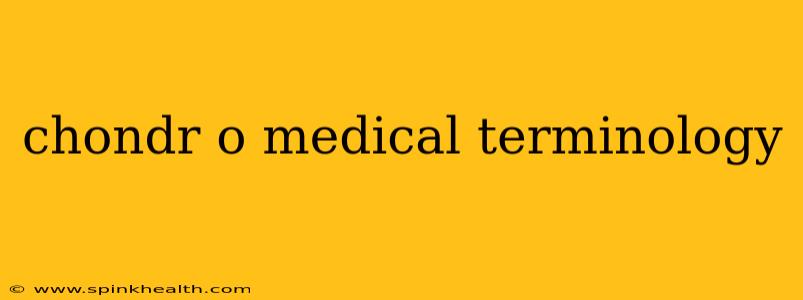Decoding the Mystery of "Chondro-" in Medical Terminology
Let's embark on a journey into the fascinating world of medical terminology, focusing specifically on the prefix "chondro-". This seemingly small word part holds a significant key to understanding a wide range of medical conditions and procedures related to a crucial part of our bodies: cartilage.
Imagine a bustling city, its skyscrapers representing bones, and the smooth pathways connecting them symbolizing cartilage. Cartilage, that resilient, flexible connective tissue, plays a vital role in cushioning joints, providing structural support, and enabling smooth movement. The prefix "chondro-" simply means "cartilage," providing a foundational understanding for many medical terms.
What does Chondro- mean in medical terms?
The prefix "chondro-" directly translates to "cartilage." This simple definition unlocks the meaning of numerous medical terms, providing clarity and understanding in the often-complex world of medicine. Its presence immediately signals that the term is related to the structure, function, or diseases of cartilage.
What are some common medical terms starting with chondro-?
Let's explore some common medical terms that incorporate "chondro-" and see how this simple prefix enriches our understanding:
-
Chondrocyte: This term refers to the specialized cells that live within and maintain the cartilage matrix. Think of them as the hardworking maintenance crew, constantly repairing and rebuilding this vital tissue.
-
Chondroma: This term describes a benign (non-cancerous) tumor that develops within the cartilage. While benign, its growth can still cause problems depending on its location and size.
-
Chondrosarcoma: In contrast to chondroma, chondrosarcoma is a malignant (cancerous) tumor originating in the cartilage cells. This necessitates prompt medical attention and treatment.
-
Chondritis: This term denotes inflammation of the cartilage. It can affect different areas of the body and can have various underlying causes.
-
Chondrogenesis: This refers to the process of cartilage formation. Understanding chondrogenesis is crucial in fields like regenerative medicine where scientists strive to create new cartilage to repair damaged joints.
-
Chondromalacia: This term, often used in the context of "chondromalacia patellae," signifies the softening and deterioration of the cartilage under the kneecap. This is a common cause of knee pain.
What are the causes of chondromalacia?
Chondromalacia patellae, a frequent condition impacting the kneecap cartilage, often stems from overuse, misalignment of the kneecap (patella), or previous injuries. Factors like muscle imbalances, flat feet, and excessive running or jumping can also contribute to its development.
What are the symptoms of chondromalacia?
Symptoms of chondromalacia can range from mild to severe, including pain behind the kneecap, particularly during activities like climbing stairs or kneeling, a grinding sensation in the knee, and swelling or stiffness. The pain can often worsen after prolonged sitting or periods of inactivity.
How is chondromalacia diagnosed?
Diagnosis of chondromalacia usually involves a physical examination, where the doctor assesses the range of motion, palpation for tenderness, and checks for any instability. Imaging techniques such as X-rays and MRI scans may be used to rule out other conditions and provide a detailed assessment of the cartilage.
How is chondromalacia treated?
Treatment for chondromalacia often focuses on conservative approaches, including physical therapy to strengthen the muscles around the knee, improve flexibility and reduce pain. Rest, ice, and pain-relieving medications are also commonly prescribed. In severe cases, surgical intervention may be considered.
In conclusion, understanding the prefix "chondro-" opens a window into the complex world of cartilage and related medical conditions. From benign tumors to debilitating arthritis, the terms built upon this prefix provide essential clarity in the medical field, facilitating better communication between medical professionals and patients. This knowledge empowers individuals to ask informed questions and advocate for their own healthcare.

